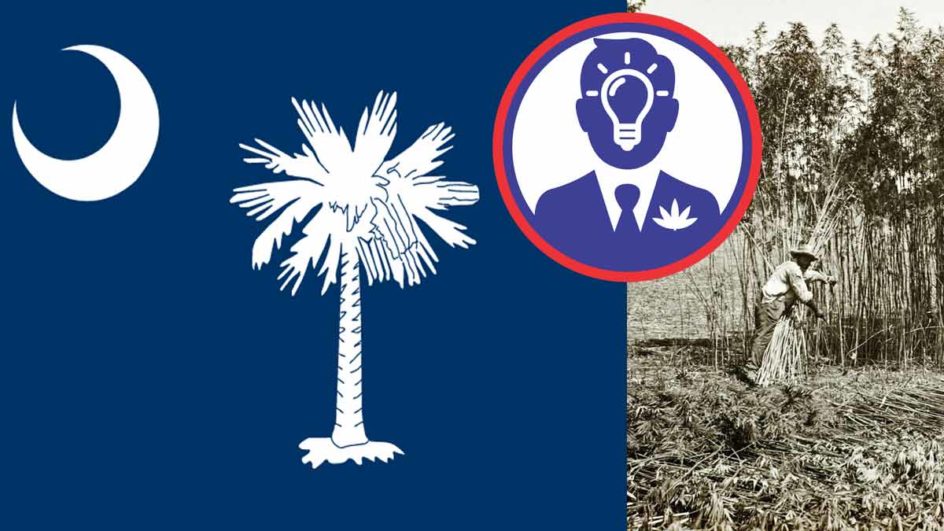South Carolina Gov. Henry McMaster signed House Bill 3559 on May 11, 2017 legalizing the growth of industrial hemp in the state through the South Carolina Industrial Hemp Program. The new bill authorizes the Department of Agriculture to issue up to 20 permits during the pilot program’s first year, with each permittee authorized to grow up to 20 acres of hemp. In the second and third years, the DOA can issue up to 40 permits, with each permittee authorized to grow up to 40 acres of hemp.
The permits are to be given to South Carolina residents for the purposes of a pilot program. Each permittee is permitted to grow industrial hemp on up to twenty acres of land the first year and up to forty acres the second year and third year, and every year after, the Department of Agriculture, along with the institutions of higher learning, will evaluate the program to determine the amount of acreage permitted. (House Bill 3559)
Gov. Nikki Haley in 2014 signed a previous bill but it didn’t create a mechanism for permitting and regulating the crop. MJI News reported Rep. Russell Ott, D-Calhoun, one of the bill’s co-sponsors, told the South Carolina House of Representatives the importance of this bill during legislative sessions. “I can tell you as a farmer, one of the most important things is that you diversify your portfolio, and all I can tell you ladies and gentleman is that’s what we believe we’re doing here is allowing a new crop, because that is what industrial hemp is, it’s a crop, it’s a commodity, and we believe that we’re going to be able to allow our farmers to engage in growing this.”
Ott also stated during the debate that the bill was the result of compromise and collaboration between the Department of Agriculture, Clemson University, the law enforcement community and advocates.
Palmetto Harmony – Vertical Integration Cometh
Janel Ralph, owner of Palmetto Harmony, explained the importance of the new bill to Hemp Business Journal.
“I think this legislative framework can make South Carolina the best hemp program in the country. We looked at what other states were doing and improved upon the legislation. It’s a big win for South Carolina farmers, and it allows a new crop that can replace tobacco in crop rotation. ”
Palmetto Harmony currently uses hemp grown in Kentucky as permitted under the KDA’s Industrial Hemp Research Pilot Program, but the new South Carolina legislation offers Palmetto Harmony the ability to vertically integrate its entire business in South Carolina.
“I’ve worked diligently for the last few years to pass a comprehensive piece of legislation. One of the key things we did was to properly put in testing requirements so we know a product is going to a viable lab,” Ralph told Hemp Business Journal. “What this will do for my business is allow for us to bring our complete business home to South Carolina. We can vertically integrate and then expand into more markets.”
An important difference between South Carolina’s legislation and other state hemp programs is testing is required by an International Organization for Standardization (ISO) Certified Laboratory Facility and addresses specific, individual cannabinoids.
(D) An independent testing laboratory shall demonstrate the ability to accurately quantitate individual cannabinoids in both their acidic and neutral forms down to 0.05 percent by weight, including, but not limited to, delta‑9 THC, delta‑9 THCA, cannabidiol (CBD), and CBDA. (House Bill 3559)
Additionally, the legislation addresses the challenges in other state concerning crops that test over .3% THC but under 1% THC. In states like Colorado and Kentucky, for example, a crop testing .5% THC (anything over .3% THC) must be destroyed. South Carolina learned from these challenges and included the following in their legislation to “recondition” crops that “test hot” to provide safeguards to growers so entire crops won’t be destroyed where THC is minutely over the required .3% requirement (and perhaps due to variability in testing).
Growers or processors may retain any industrial hemp that tests between three‑tenths of one percent to one percent delta‑9 tetrahydrocannabinol on a dry weight basis and recondition the hemp product by grinding it with the stem and stalk. Industrial hemp products must not exceed three‑tenths of one percent delta‑9 tetrahydrocannabinol. (House Bill 3559)
In addition to providing farmers in South Carolina with a new agricultural commodity, the South Carolina hemp bill also allows public institutions of higher education with four-year degree programs to research the applications and market opportunities of industrial hemp.
“This bill allows South Carolina to be a leader in quality control from seed to sale and further research into this incredible plant. Palmetto Harmony is growing by leaps and bounds. We’re thrilled to see how this legislation helps farmers, business owners and our customers,” said Ralph.

